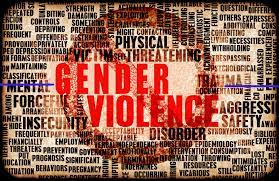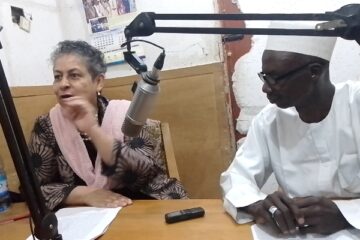From lack of toilet at home to forced marriage aid sexual violence in Adamawa

From lack of toilet at home to forced marriage: How poverty, absence of diligent prosecution aid sexual violence in Adamawa
Poverty situation and lack of basic social facilities such as bathroom have continued to expose women and girls to horrific rape encounters in Adamawa. HASSAN UMAR SHALLPELLA reports
The eight-year-old girl was found in a pool of blood at Gada-Walowal in Yolde-Pate, a suburb of Yola town in Yola South Local Government Area of Adamawa State sometime last year.
She was suspected to have been raped by unknown person while she eased herself outside of her parents’ uncompleted building where she lived with her family.
She was forced to go out at night, as the ramshackle building lacked any toilet she could use. The family lives temporarily in an open, bushy, uncompleted building without access road in the outskirts of the town. The family used tattered clothes to cover doors and the windows so as to protect themselves from the harsh weather.
The owner of the building offered them to stay for a while, as the head of the family who is a wood cutter did not own a personal house due to abject poverty, while the young girl’s stepmother works as a housemaid in the house of a wealthy person far from their residence.
And though the eight-year-old Girley (a pseudonym) survived the ordeal, the horrific encounter was a rude shock to her young, undeveloped body and, subsequently, her psyche.
Her stepmother said that the family reported the matter at Yolde-Pate Police Station, but nothing was heard from the Police who had promised to fish out the perpetrator and bring him to justice. The issue soon assumed a wild goose chase, as the Yolde-Pate Police Station said it had referred the matter to Hope Centre at the Specialist Hospital, Yola.
Also, on June 5, 2021 18-year-old, Ayuba Hamza was arrested for sexually assaulting a four-year-old girl-child in Jabbi Lamba village, Girei Local Government Area of Adamawa State. The child was under the custody of her grandmother following the separation of her parents.
Another case of child molestation featured a 35-year-old man, Ibrahim Wakili, of Babal community in Malabu Ward, Fufore Local Government Area of Adamawa State. Wakili was arrested for defiling a seven-year-old girl (name withheld).
Wakili was married to two wives and had 10 children as of the time of the incident. He confessed to the crime at the Chief Magistrate’s Court in Yola town, stating that he lured the little girl and forcefully defiled her in one uncompleted building in their community.
Lack of sanitation facilities linked to higher rape incidents
Researchers at the University of Michigan note that females who lack access to bathrooms in their homes are more likely to face sexual violence.
According to a new study, women who use open defecation sites are twice as likely to get raped when compared with women using a home toilet.
“None of the earlier sanitation studies have looked at the connection between access to a toilet and women’s risk of sexual violence,” said Apoorva Jadhav, lead author and postdoctoral fellow at the University of Michigan’s Institute for Social Research; adding, “We need more than anecdotes to bring a policy change.”
Again, a joint report by the London School of Hygiene & Tropical Medicine; World Health Organization, and the South African Medical Research Council notes that rape is a human rights violation. It also has a negative impact on the mental health and social wellbeing of women and girls, the report avers.
In another part of Adamawa State, 35-year-old Dahiru Shuaibu, a resident of Sabon Gari Sangere in Gerei Local Government Area, was arrested for allegedly raping a 10-year-old girl. Parents of the victim who were said to be migrants have relocated to unknown location. According to some residents, the victim had got all necessary medical attention, and Police said the accused was prosecuted.
Shameful statistics
Between year 2020 and the first half of 2021, Adamawa State recorded 774 cases of sexual and gender-based violence, with only 297 of the perpetrators convicted as of July.
Adamawa State Commissioner for Women Affairs and Social Development, Lami Patrick Ahmadu, added that between May and October 2020 alone, Adamawa had recorded over 350 cases of rape and other sexual assaults, mainly perpetrated by males against females.
Mrs. Saso Ali, the Permanent Secretary in the Adamawa Ministry of Women Affairs and Social Development said that 89 per cent of the perpetrators were charged to courts after receiving services from the police.
“By the reports, I received from Adamawa Hope Center, the Gender-Based Violence (GBV) is on the increase in spite of the sensitization and awareness creation on the ills of rape by government agencies and development organizations.
“We are yet to secure a single conviction on the cases.
“If we do not have conviction, some bad elements will continue to commit rape because they may feel that nothing will happen to them,” she said.
And, while males also experience sexual and gender-based violence, experts are of the opinion that it is more common among females.
The Technical Lead, Managing Conflict in Nigeria Programme, Dr. Ukohi Ukiwo, disclosed this in Yola during a five-day capacity building workshop comprising doctors, nurses and counsellors, who underwent training on the management of sexual and gender-based violence.
Adamawa State Primary Healthcare Development Agency organized the workshop in collaboration with the MCN and it was funded by the British Council through the European Union.
A social menace
Sexual and gender-based violence is a social menace that horrifies most Nigerian communities, Adamawa State inclusive. Reported virtually on a daily basis, cases of SGBV across Adamawa state include domestic violence and rape.
Due to its pervasiveness and the need to tame the monster, the United Nations General Assembly has designated every November 25th as the International Day for the Elimination of Violence Against Women, which serves as a platform for governments, international organizations and non-governmental organizations to hold activities, including rallies, to raise public awareness about the issue.
The day is also used to commemorate the brutal assassination of three Mirabal sisters who were political activists in the Dominican Republic in 1960 on orders of former ruler, Rafael Trujillo.
Forced marriage
Our Correspondent reports that forced and, sometimes, underage marriage, which is also common in Adamawa, is another form of sexual and gender-based violence against females.
Last September, 19-year-old Rumasau Muhammad of Wuro Yanka Village, in Shelleng Local Government Area of Adamawa State, allegedly stabbed her 35-year-old husband, Muhammad Adamu, to death.
She was said to have been forcefully married to the deceased by her parents against her will less than a month earlier and the marriage lasted for only three weeks. Her quest for divorce reportedly met with stiff resistance by her husband.
Victims’ pathetic vulnerability
Majority of survivors of SGBV, particularly rape, in Adamawa, are minors, and children of the less privileged and low-income earners.
Speaking to our correspondent, Ms. Nuwama Ishayaku, interim Secretary, Adamawa Network Against Rape (ANAR), said, “Most of the rape cases we received happened to the underprivileged children whose cases were brought to us by some good Samaritans for the pursuant of justice.”
She added that most of the parents of the survivors belong to class of people in the society who cannot afford three square meals per day.
Such a classical case is the eight-year-old girl found in a pool of blood at Gada-Walowal in Yolde-Pate, a suburb of Yola town whose family lives temporarily in an open, bushy, uncompleted building.
Kwairanga Suleiman Hammanadama (team leader, surveillance Bole/Yolde-Pate Ward), said that within the community, a place has been designated for girls to display their wares as part of measures to curtail rape cases, because most of the victims are girls who hawk wares.
Also corroborating Hammanadama, Hajiya Zainab Umar, Women Leader of Kautal Horre Gada-Walol Yolde-Pate, said the association encourages women to sell their wares at home rather than sending their little gilrs to hawk, which gives room for rapists to assault them.
Long-lasting depression after rape
The issue usually creates a long-lasting depression in the minds of the parents/guardians of survivors who now seek justice for their children.
Mallam Muazu Mohammed Habib, Head of Psychology Department, Federal College of Education (FCE) Yola, said parents whose children were sexually assaulted will have psychological disturbances.
“There will be unrest from the parents, society is silent, society is bankrupt, and everywhere there is economic imbalance,” Habib said.
The Psychologist added that, “Psychologically, you can say that the rape survivor can be deprived of many things, including social access, emotional instability and physical damage.””
Formation of Media/CSOs to fight SGBV
In their efforts to contribute to the fight against rape and other sexual assaults against girls and to support survivors of rape and other violations against women and girls, in February 2019, some media practitioners and civil society organization formed a formidable pressure group called Adamawa Coalition Against Rape (ACAR), which later metamorphosed into Adamawa Network Against Rape (ANAR).
Ms. Nuwama Ishayaku, interim secretary of the Network, said that fighting rape is a collective responsibility, hence the formation of the network.
“We do pursue cases from onset to logical conclusion, but we are handicapped, as the judicial system is weak on rape cases in Adamawa, but we are optimistic that with the VAPP Act on ground, survivors of gender-based violence will now get justice.
“Most of the rape cases we received are the underprivileged whose cases were brought to us by some good Samaritans for the pursuant of justice,” she said.
Community participation
The role of the community in the fight against sexual and gender-based violence cannot be overemphasized. Some members of Yolde-Pate community in Yola South Local Government Area of Adamawa State have been enlightening the community on dangers associated with hawking by minors.
Kwairanga Suleiman Hammanadama (Team leader surveillance Bole/Yolde-Pate ward), said that the rate of rape cases in the community had reduced drastically due to the intensive enlightenment campaigns embarked upon by members of the team.
“There were lot of rape cases in the community before, but with the enlightenment campaigns, the number of girls who engage in hawking has reduced.
“A place within the community was designated for the girls to display their wares as part of measures to curtail rape cases, because most of the victims are girls who hawk”, Hammanadama said.
On her part, Halima Hamidu, Secretary at the Green White Green Alheri Women Association, Yola, said that most of the survivors of SGBV were hawkers who roam without being monitored by parents.
“We usually gather women and lecture them on how to guard themselves from falling victim of SGBV, particularly rape,” she said.
Role of Security
According to report by the Adamawa State Police Command, following the enactment of the state Violence Against Persons Prohibition (VAPP) Act, the command had prosecuted over 21 cases relating to gender-based violence.
According to DSP Suleiman Yahaya Nguroje, Police spokesman in the state, several rape cases have been recorded across the state, but the Police needs enough time to compile an accurate statistic on the number of cases recorded in 2020 and 2021.
Government Response
The Adamawa State Governor, Ahmadu Umaru Fintiri, on 30th August, 2021 signed a Violence Against Persons Prohibition (VAPP) Act into Law, making Adamawa the 17th state in Nigeria to adopt the law. It may be recalled that the National Assembly had passed the law, while then President Goodluck Ebele Jonathan assented to it in 2015.
Ways to end SGBV in the society
Adamawa state government should speed up the establishment of special courts designated for the trial of sexual and gender-based violence cases, while families of the victims should do away with the culture of shyness and speak out by exposing perpetrators of the crime and stop shielding the perpetrators, no matter their status in the society or within the family.
Judges who preside over cases of sexual and gender-based violence should ensure speedy trial of cases, and appropriate punishment should be meted to anyone convicted of the crime. This will serve as deterrence to others.
For the government, aside from setting up a trauma counselling centres for the survivors of SGBV, contents of the VAPP Act should be translated into local languages for the benefit of those who may not be able to understand English. That way, everyone will be educated about the demands of the law.
Support for this story was provided by the Media and Gender Project of the Premium Times Centre for Investigative Journalism (PTCIJ) #CREATESAFESPACES”


















